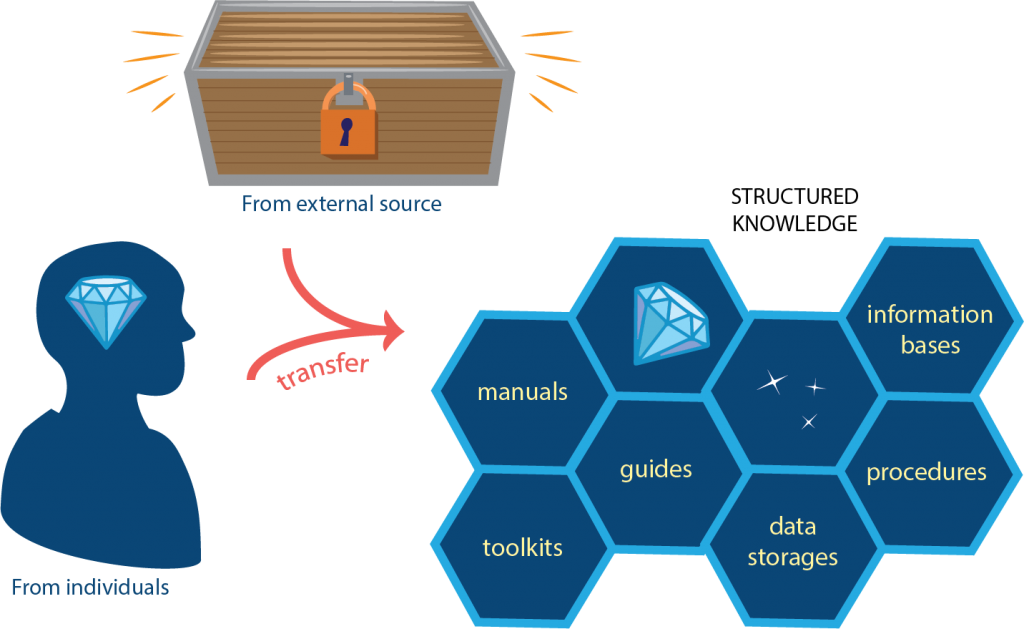
We’ve spent so much of our resources into someone’s education, but he/she left our organization leaving us without
Have you experienced something similar?
Well, identifying and creating knowledge is important for your organization in this very moment. However, if you want to have benefits from that knowledge on a long run and allow for its upgrade as the time passes by, then you need to find a way to “warehouse” that knowledge. To document it.
This means transfer of knowledge into guides, procedures, manuals, toolkits, data storages, information bases, etc. We will call it Structured knowledge.

Often, this is not an easy task!
You need to:
-
Transfer knowledge that individual has into Structured knowledge
-
Transfer knowledge from external resources into Structured knowledge.
First one is very important, yet difficult process. Your task is to ensure that all knowledge that people from your team has become transferred into structured knowledge. Achieving to do so, you will allow others to have use of transferred knowledge, refer to it when necessary and what is more important learn from it and upgrade it.
Second one means, transfer of knowledge coming from external resources into internal organizational manuals, guides, procedures, etc. Your task here is to map all external knowledge necessary for the work of your organization, and then adjust it and standardize it to fit your organizational needs.
For the process of knowledge safeguarding, it is important to follow these steps:
-
Define processes of safeguarding knowledge within the organization
- Define ways in which knowledge will be kept – databases, manuals, etc.
- Structure knowledge according to type or area of work
- Translate it into Structured knowledge
- Define approaches to that knowledge and give permission to relevant team members.
Transferred and stored knowledge into “warehouse” is not there to stay. But to be transferred further – to the people within your organization.
Everything you have done doesn’t have
Make a structured knowledge accessible to the people for whom you see its relevant (if you don’t have anything to hide, then make it accessible to everyone). Arrange a plan how this structured knowledge will be implemented into work of your team and define monitoring processes. You need to track its implementation into everyday work, receive a feedback and then if necessary, improve structured knowledge.
At the end, it would be wise to appoint one person who should be in charge of knowledge management within your organization. That is a person who will make sure that all processes run smoothly and efficiently.

EXAMPLE / TASK
What knowledge would be lost from your organization if someone leaves your team?
Do you have answer on this question? Well, to be honest most of the people who run organizations do not have detailed answer on this question written down. Mostly they are aware of some skills and knowledge people in their team have, however they can easily forget about it after some time.
Mapping this out and transfer it before someone leave will help your organization grow further.
Let’s see how this works out on experience and knowledge in project management. Bring your team together and try mapping their project management skills by identifying answers on the following questions (please add some more questions you find as relevant):
- What is their level of knowledge in application writing?
- What is their level of knowledge in consortium building?
- What is their level of knowledge in application budget designing?
- What is their level of knowledge in event management?
- What is their level of knowledge in financial management?
- What is their level of knowledge in promotion, visibility and dissemination?
- What is their level of knowledge in reporting and administration?
Next step is to connect people and their knowledge with relevant processes in which they have experience. Map it so you have everything written. Now, go with them through to existing procedures you have in your organization.
Eg. Take a look with person who has knowledge in event management on your organizational procedures which you follow when organize some event. If you don’t have any yet, no worries. We will guide you now to transfer knowledge from that individual into your internal procedures.
➤ Ask that person to map all processes and tasks which commonly need to be done at some event.
➤ After mapping, discuss with that person and other relevant people from your team if from their experience there is something more to be added which your projects often have. Upgrade map of processes.
➤ Ask a person who has a knowledge in event management to write a Set of procedures your organization should follow when doing some events. This means for example to write step by step procedures and template of documents you need when implementing some seminar:
-
Guidelines for creating Call for participants for your event
-
Structure of the application form
-
Answers on the approved or declines applications, or even those who are on the waiting list
-
Standards of your work in regard to working environment (conference room and equipment)
-
List of materials mostly used at your seminars (flipchart papers, pens, markers, stickers, etc.)
-
Template of the list of participants and trainers
-
Template of the reimbursement forms
-
Template of the session outline
-
Template of the evaluation forms
-
Etc.

Designed set of procedures and templates make accessible to others from your team for a comments and suggestions. Gave collective feedback to the person who wrote procedures and ask him/her to finalize Set of procedures.
Upon finalization ensure that Set adequately presented to the others from the team and that they should follow these procedures in their work.
When you manage to do this, you ensured that even if that person left organization, his/her experience will stay. Also, you shared knowledge with others making it useful for quality of your organizations work.
